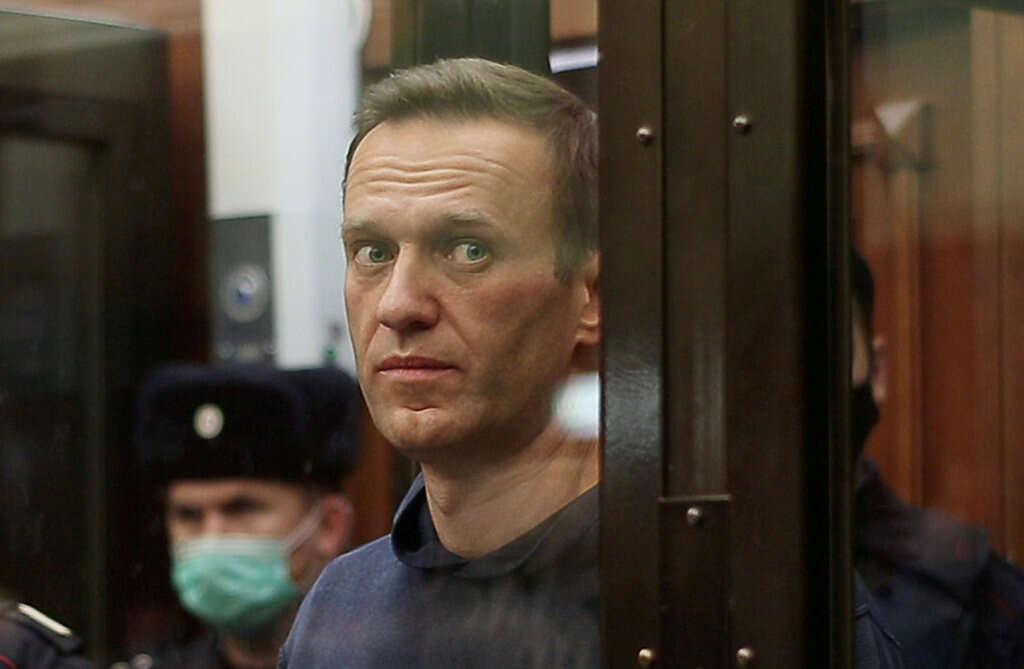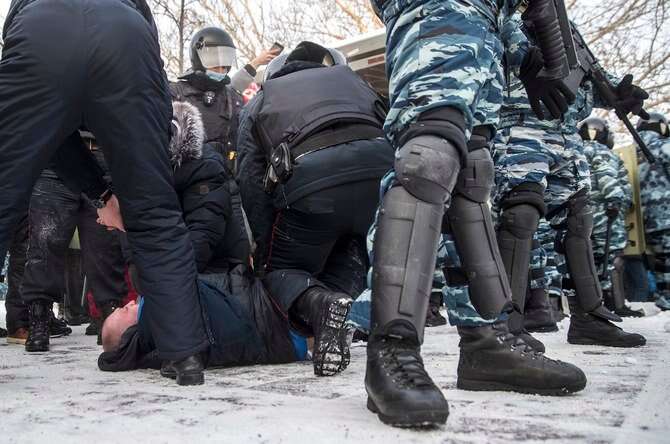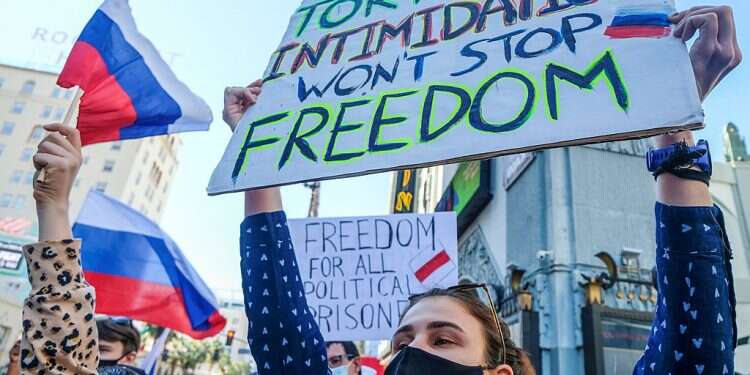Not more than a few minutes had passed from the sentencing of Russian dissident Alexei Navalny, than the protesters began taking out to the streets in frigid weather, lashing out at their president, Vladimir Putin. Chanting "Putin, you are a thief!" they made their voices heard, demanding that the leading opposition figure be freed. Their cries were reciprocated by honking cars, as thousands of drivers in Moscow's rushour joined their cause.
Follow Israel Hayom on Facebook and Twitter
"There aren't enough words in the Russian language to describe what I feel right now," said one of the female protesters on live television, speaking with a reporter from the independent station Dozhd. "I am outraged; his sentence is unfathomable in its arbitrariness. I have tears in my eyes, I have pain and fear. I am very scared that nothing will change. I was very scared when I got out to protest, but when I saw just how many people came along I realized that perhaps there is a chance."
St. Petersburg's residents joined their Russian compatriots in the spontaneous protest. But they too were dispersed by the riot police, which used batons and electric shockers against anyone who stood in their way. Someone gave the order to clear the city centers, and the mission was accomplished with more than 1,000 detained and arrested. But the battle over Russia, which seemed stable to Israeli eyes until recently, had only just begun.

It has been three weeks since Navalny's return to Russia, after spending time in Germany to recover from an apparent assassination attempt. His arrest at the Moscow airport led to a wave of protest that has continued ever since. The Russian agents' attempt to kill him with the chemical agent Novichok shocked even those who were not among his supporters. His rehabilitation has made many more look at him with awe. And the Kremlin's efforts to shed any responsibility and its continued effort to spread lies on Navalny has unnerved anyone who has integrity.
But when he decided to come back to Russia despite knowing full well what he could expect, Navalny became an iconic figure, a living symbol. Why would a man who has narrowly escaped death be willing to go all out against a regime that has unlimited resources? If there was someone or something that would shake many parts of Russian society out of its constant helplessness and put an end to the creeping expansion of the powers of the regime, such a figure would have to be of mythical proportions. Navalny apparently meets those requirements.
When asked on why he would ever want to come back to Russia, Navalny's response was simple: "This is not a question that I have ever faced; that's because I have never left. I found myself in Germany because I was transported there after the assassination attempt … Russia is my homeland, and Moscow is my city; and I miss both." He repeatedly said that he would not abandon Russia to a gang of corrupt officials. For Navalny and his team, one thing was obvious: If he stayed in Germany, he would gradually become a pundit on Russian affairs and in any event, it was safe to assume that his would-be assassins would know how to reach him outside of his homeland.
The regime incites and inflames
What has happened in Russia is just what Navalny's people have prepared for. The Kremlin, which could not confess to having tried to assassinate him, let alone assume responsibility for the action, detained him so that he would stay away from the public sphere. This is why it has undusted his past criminal case from 2014 in which he was sentenced to 3.5 years in prison for fraud (even though none was proven and Russia compensated him for that).
Navalny was required to present himself with the authorities in 2019, but his probation period was extended to 2019 so that the leverage can be preserved. The coma that he fell into after his assassination attempt in August did not prevent the authorities from citing him over not showing up for this appearance and ruling that he had violated the terms of his suspended sentence - sending him to prison.

"The main thing to remember in this whole affair is that this is not over. Regardless of my imprisonment, the goal is to terrorize as many people," Navalny said before he was sentenced. "Now everyone knows that Putin is just a clerk that happened to be promoted to become president and his only way to deal with political rivals is through assassinations. No matter how many times he casts himself as a great statesman, he will go down in history as a poisoner. There was Alexander the Liberator, and Yaroslav the Wise, and now there is Vladimir the underwear poisoner," Navalny continued, referring to the method in which Putin supposedly tried to kill him.
Now the question is what will happen with the protest. While it would be premature to declare a new era, one cannot ignore the fact that there has been a major tectonic shift in Russia. Over the past two weeks, hundreds of thousands of protesters have taken to the streets, from the far-flung eastern cities of the federation all the way to Kaliningrad on the Baltic Sea. Protesters even picketed the Russian Embassy in Tel Aviv.
Another important matter in the protest is the generational divide. According to anthropologist Alexandra Arkhipova and her scientific group, some 40% of the protesters in Moscow and St. Petersburg are aged 25-35. These young individuals can't remember anyone other than Putin as their leader, but they are also the most Westernized generation Russia has ever had. The collapse of the Soviet Union, which Putin considers a national tragedy, is not even a faint memory for them. They know that life can be different and that liberty is a value worth fighting for.
This is one of the reasons for the unprecedented number of protesters who took to the streets for the first time in their lives: 42%. Another reason is that the trial showed many just what kind of country they have been living in, feeling as if they are all in some Kafkaesque tale in which they are all potential convicts and that all the regime needs to do is to gin up some accusations against them and pretend to carry out the due process of the that would create the mirage of law and order. Meanwhile, the regime is doing all it can in order to exacerbate the situation. The Kremlin has gambled on an immediate quashing of the unrest, with increasing brutality, while carrying out arrests en masse alongside non-stop propaganda on social media and television.

For the regime, this is the only course, because the very foundation of Putin's hold on power using the security forces is also his source of weakness. Now that the affair is no longer in the administrative-political world and is being run by the spooks, the path toward violence is paved. Another reason for this violent turn is the constant paranoia Putin has. He fears a mole is within his ranks or that foreign actors are trying to meddle in Russian affairs. This is clear in the attempt to tie Navalny to the CIA and through the Draconian laws that were passed some two months ago designating any non-Kremlin civilian entity as a foreign agent. WIth this lay of the land, anyone who has power must show utmost loyalty or face the consequences.
What does all this say? Perhaps it is safe to assume that the protests in support of Navalny will continue in the coming weeks, alongside a ratcheting up of the regime crackdown measures.
It also means that Russia is undergoing a pre-revolutionary transformation, even if no real revolution is in the offing. On the other hand, the stability in Russia is sometimes just a matter of optics. "Everything was forever until it was no more," the Russian-American anthropologist Alexei Yurchak said in the title of his book on the fall of the Soviet Union. Perhaps this template will apply this time as well.
Subscribe to Israel Hayom's daily newsletter and never miss our top stories!




